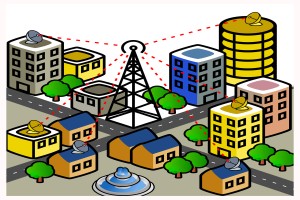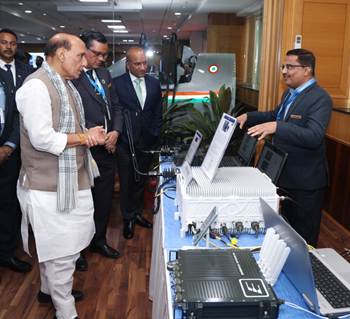
No distinction between Domestic and International OSPs to bring in better synergies among businesses
New Delhi: The Department of Telecommunication has further liberalized the guidelines for Other Service Providers (OSPs), Ravi Shankar Prasad, Union Minister for Electronics and Information Technology, Communications and Law and Justice, announced in a press interaction today. He said these entities were business process outsourcing (BPO) organisations giving Voice-based services, in India and abroad.
The Guidelines issued today further liberalised the special dispensation given to OSPs in addition to the major measures already announced and implemented in November, 2020.
The main features of the liberalised guidelines announced today are :-
- Distinction between Domestic and International OSPs has been removed. A BPO centre with common Telecom resources will now be able to serve customers located worldwide including in India.
- EPABX (Electronic Private Automatic Branch Exchange) of the OSP can be located anywhere in the world. OSPs apart from utilising EPABX services of the Telecom Service Providers can also locate their EPABX at third Party Data Centres in India.
- With the removal of the distinction between Domestic and International OSP centres, the interconnectivity between all types of OSP centres is now permitted.
- Remote Agents of OSP can now connect directly with the Centralised EPABX/ EPABX of the OSP/ EPABX of the customer using any technology including Broadband over wireline/ wireless.
- No restriction for data interconnectivity between any OSP centres of same company or group company or any unrelated company.
- It may be recalled that DoT has already exempted Data Based Services from the OSP regulations. In addition, the regulations exempted OSPs from requirement of any registration. Also, no Bank Guarantees were to be furnished. Work from Home and Work from Anywhere was also permitted.
- Penalties for violations were removed altogether reaffirming the trust Government has in business.
- Further liberalisation of Guidelines today will provide a big fillip for growth of OSP industry in India. This will create immense opportunities, income and employment in India.
OSP reforms impact survey conducted by NASSCOM in April 2021, enumerated following important findings :
- Over 72% of the respondents mentioned that they are highly satisfied with the OSP reforms
- 95% of the respondent mentioned has helped in reducing the compliance burden and cost of doing business in India
- 95% of the respondent also stated that this will help in making IT services more competitive globally
- Another 77% of the respondent mentioned that OSP reforms has helped in increasing the productivity
- 92% of respondent stating that reforms also helped in reducing the financial burden on the companies
- 62% of the respondent mentioned that they will consider expanding their operation or will make fresh investments basis the OSP reforms
- 55% also mentioned that this will help in generating new employment opportunities and will enhance access to talent
Today’s reform will further help the BPM industry to reduce their establishment cost and creating synergies among different companies. Through these reforms more and more MNCs will get attracted towards India as a favorable destination and hence will lead to more FDIs, the Minister said.
Stressing that AatmaNirbhar Bharat was the key initiative of the government, Prasad said steps like Electronics Manufacturing Productivity Linked Incentive scheme, starting dedicated scheme of Electronic Manufacturing Cluster and dedicated PLI scheme for Telecom Equipment were few steps in this direction.
Similarly, he said, Ease of Doing Business was another fulcrum based on which series of reforms has been initiated in IT & Telecom vertical by the government. Start of one touch VNO licenses, Spectrum Sharing & Trading, Delicensing of certain frequency bands and now Next Gen OSP liberalisation was another step in this direction.
In November 2020, OSP guidelines were liberalized as following:-
-
-
- Data related OSPs were totally taken out of ambit of any regulation
- No Bank Guarantees
- No requirement of static IP
- No requirement of reporting to the DoT
- No requirement of publication of Network Diagram
- No penalties
- Made Work from Anywhere a reality
-
Prasad informed that India’s BPO industry is one of the largest in the world. Today India’s IT-BPM industry stands at US$ 37.6 billion (2019-20) i.e. Rs. 2.8 lakh crores approx. giving job opportunities to lakhs of youths in the country. Further it has a potential for double digit growth reaching upto US$ 55.5 billion i.e. Rs. 3.9 lakh crores by 2025.
The BPM industry revenues grew from USD 37.6 billion in 2019-20 to USD 38.5 billion in 2020-21, despite the pandemic. “This was largely possible due to the industry’s ability to work remotely and majorly enabled by the Government of India’s relaxations of WFH requirements under the OSP regime, first temporarily, in March 2020 and then complete reforms under the new guidelines in November 2020,” the Minister said.
The Highlight of the Global Business is given below
- Current BPM market – USD 198 BN
- Outsourcing Market – USD 91 BN (46%)
- Current BPM outsourcing revenue, India – USD 38.5 BN (Rs 2.8 lakh crore)
The Minister also highlighted that FDI during present government and previous United Progressive Alliance government, that stood at :

– global bihari bureau





